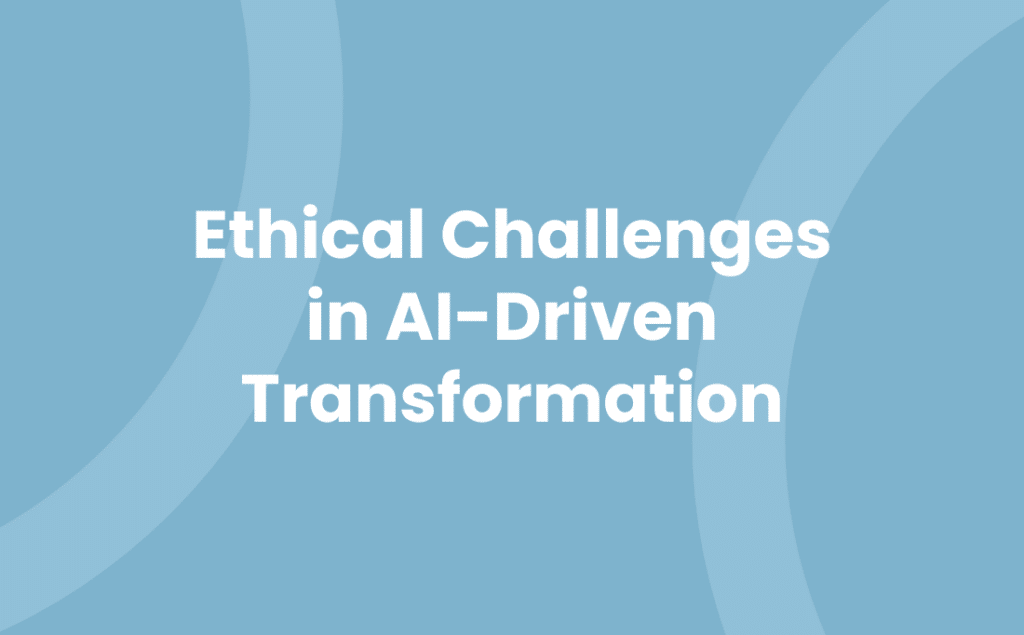Artificial intelligence (AI) is driving remarkable transformations across industries. But with great power comes great responsibility. The ethical considerations around AI-driven digital transformation can’t be overlooked.
From privacy concerns to issues of bias, the ethical landscape of AI is vast and complex. It’s crucial for businesses and individuals alike to understand the potential pitfalls and ensure ethical practices are embedded in their AI strategies.
Understanding AI-driven Digital Transformation
Diving deeper into the topic of AI-driven digital transformation, you’ll quickly realise that it’s much more than mere application of AI technologies to improve business operations. Notably, ethical AI digital strategy becomes an integral facet of these processes.
Firstly, AI-driven digital transformation represents the fusion of artificial intelligence with the digital world, in an effort of businesses to cut costs, increase efficiency, and enhance customer experiences. It encapsulates components like machine learning, data science, and robotics, offering sophisticated tools that simplify tasks, improve decision-making and create strategic value.
But with these advantages come ethical considerations, which are increasingly pivotal in this age of digital progression. For example, AI technologies often process extensive amounts of personal data, pushing privacy concerns into the limelight. Furthermore, as machines take over human tasks, issues revolving around job displacement and societal disruption rise.
Also, an ethical AI digital strategy lays emphasis on bias and fairness. AI systems trained on biased data could perpetuate or even exacerbate existing inequalities, bringing forth moral and practical challenges.
What’s more, AI systems’ actions, particularly in sensitive areas like healthcare or law enforcement, can have grave ramifications, amplifying the need for transparency and accountability.
In navigating this tech-driven ecosystem, understanding these ethical challenges isn’t just an option, it’s a necessity. To confront potential pitfalls and ensure responsible implementation, businesses must balance their AI ethics with digital transformation.
Take data privacy for instance. To comply with regulations, adopting privacy-by-design models and engaging in continuous privacy assessments becomes central. Upon detecting biases, businesses must strive for fairness, using techniques that recognise and mitigate bias in AI systems. For job displacement, offering up-skilling opportunities couched within employee welfare considerations can combat the negative impacts.
In essence, the core of understanding AI-driven digital transformation lies not merely in comprehending the associated tech, but in grappling with the concurrent ethical quandaries as well. To truly harness the benefits of this tech revolution, it’s imperative to thread the path of ethical AI digital strategy, minding digital ethics every step of the way.
The Importance of Ethics in AI-driven Digital Transformation
Ethical practices in the realm of AI-driven digital transformation take centre stage, given the mushrooming interest in AI ethics. Remember, AI’s utility in digital strategy is twofold. By leveraging AI capabilities, you can achieve operational excellence and superior customer service. Nonetheless, ethical considerations play a quintessential role in actualising this potential.
For your digital strategy to be both successful and ethically sound, you must reconcile AI’s computational power with the moral obligations underpinning its usage. AI systems process enormous amounts of data, magnifying minor errors or biases into sizable detriments for those affected. This amplification has an expansive reach given AI’s integration in various industry spheres, underscoring the importance of ethical AI digital strategy.
You are tasked to consider the moral implications that come with AI-driven digital transformation. Think about the potential job losses tied with automation. Without a comprehensive upskilling initiative, your employees face an uncertain future. AI-run systems may also bear intrinsic biases that potentially lead to unequal treatment of customers or employees.
AI utility is not solely about shiny new robotics or streamlined operations. It involves a complex dance, intertwining technical prowess with ethical responsibility. Your understanding of this relationship is vital for a successful, socially aware digital transformation. After all, the right use of AI is not about replacing the human touch, but augmenting it.
You must instate activities that underline ethics within the AI digital strategy. For instance, introduce privacy-by-design models or bias recognition measures, showing ethical integrity in your AI implementations.
Moreover, you should cherry-pick technology vendors, selecting those that emphasise transparency and ethical operations. Remember, transparency is a fundamental in for your clientele, allowing them to trust your AI endeavors.
In all, a conscious, ethical approach towards AI can buoy your digital transformation strategy. Aim to make ethics integral, not an afterthought, in your AI digital strategy. Doing so will help prevent potential pitfalls, drive customer trust, and ultimately maximise the benefits of AI in your enterprise. It’s not just about riding the AI wave; its about guiding it in the right, ethically-sound path.
The Ethical Challenges in AI-driven Digital Transformation
Unforeseen ethical dilemmas outline the path of all major technological advances, AI-driven digital transformation isn’t an exception. It’s an intricate process requiring not only technical expertise but also an ethically-mindful approach. Following a well-crafted ethical AI digital strategy goes a long way in predicting, identifying, and managing these challenges.
Firstly, prominent among the issues spinning this web of complexity is “Decision-making Control”. AI systems are designed to make independent decisions based on their programming. Yet, when these decisions affect aspects of human life, the question arises: Who should bear the final decision-making authority, AI or human? For example, in autonomous vehicles, the AI decides on navigation, speed, and even emergency actions, making decisions humans would typically make.
Second is “Bias and Discrimination”. AI systems function based on training data. Often, this data can contain unconscious bias, leading the AI to make biased decisions. A recruitment AI that has learnt from data favouring candidates of a certain gender over another will favour that specific gender, creating systemic discrimination.
The third concerns “Data privacy and security”. AI systems generate, process, and store vast amounts of data. Some classified as personal under privacy laws. Balancing between utilising this data for improved customer service and preserving customer privacy primarily poses an ethical challenge.
Lastly, the “Transparency and explainability” dilemma. While AI can outperform human experts by processing huge data volumes swiftly, their decision-making process is often opaque. This so-called ‘Black box’ problem is especially pressing in sectors like healthcare where clarity on how an AI system makes decisions is crucial.
Being conversant of these challenges forms the first step in devising an ethical AI digital strategy. Recognising the importance of ethics in this digital transformation aids in averting potential negative consequences, maximising the benefits of AI, maintaining public trust, and steering AI advancements in a universally beneficial direction.
Strategies to Implement Ethical Considerations in AI-driven Digital Transformation
The potential of AI is immense, but requires a steadfast commitment to ethical practice to prevent negative repercussions. This section explores effective strategies that uphold AI ethics in digital transformation.
- Develop Ethical Guidelines: Craft ethical guidelines specific to your organisation’s AI utilisation. These directives serve as the ethical foundation underpinning AI practices, ensuring compliance with data privacy and security norms.
- Foster Transparency: Promote openness about AI functioning. Educate stakeholders about AI technology specifics and its impact on decision autonomy. For instance, in healthcare, transparency helps patients understand diagnostic AI interpretations.
- Implement Bias Investigation Techniques: Emphasise on AI systems’ fair operation by integrating bias detection and mitigation systems. Avoid discrimination related mishaps, foster fair human-AI collaboration, and enhance your ethical AI digital strategy.
- Invest in Privacy-Preserving Technologies: Adopt privacy-enhancing technologies like Differential Privacy and Federated Learning. They offer accurate insights without compromising individual data confidentiality, reinforcing trust and privacy in AI-powered systems.
- Create a Responsible AI Team: Gather a team dedicated to addressing AI ethical obligations. This team’s mission encompasses overseeing AI ethics adherence, handling related dilemmas, and assuring responsible AI deployment and function.
By embracing these strategies, you can navigate the exciting yet complex landscape of AI-driven digital transformation ethically. Ensure you incorporate ethical considerations into every AI decision, informing a more responsible, inclusive, and trustworthy digital future.
Case Studies: Ethical Considerations in AI-Driven Digital Transformation
- Project Maven and Google – Concerns around Military Use of AI: Google’s involvement in Project Maven, a US Department of Defence initiative to analyse drone footage using AI, exemplifies the growing concerns about the military use of AI. Despite promising substantial revenues, Google ultimately backed out of the project due to internal and public backlash about ethical implications, signalling the importance of ethical considerations beyond mere profit margins. This example underlines that an ethical AI digital strategy might include limiting contributions to sectors that pose potential harm.
- IBM Watson Health – Necessity of Transparency: In 2018, IBM’s Watson for Oncology came under scrutiny when it reportedly made incorrect and potentially dangerous treatment recommendations. Critics suggested that the system’s training was based on a few artificial cases, not real-world patient data, highlighting deficiencies in transparency. This incident has accentuated the necessity of openness about AI training methods and data sources, or risk eroding trust in the system.
- HireVue – AI in HR and Potential Bias: HireVue offers an AI-based tool for HR departments, aimed at assessing potential hires through video interviews. However, it was criticised for potentially discriminating against non-native English speakers and individuals with disabilities, who may not perform well on video interviews. HireVue discontinued the use of facial expression analysis in 2020, illustrating how integrating bias investigation techniques into your AI ethics digital transformation can manage such risks.
These cases highlight ethical challenges faced by enterprises in their AI-driven digital transformation journeys. They serve as salutary lessons for organisations striving to strike a balance between the benefits of AI and potential ethical pitfalls.
Future of Ethical AI and Digital Transformation
As we propel into the future, the ethical dimension of AI and digitisation presents a critical juncture for businesses and society. Strict adherence to ethical AI principals forms the backbone of a successful digital strategy.
Recognise that the world got a glimpse of AI’s potential utility during the pandemic. Remote work became feasible, companies transitioned online, and digital health technology saw rapid advancement, all thanks to AI technology. AI’s future undoubtedly hinges on managing ethical considerations effectively as digital transformation gains momentum.
The goal? Meld ethical AI and digital transformation seamlessly. The first step involves building strategies that revolve around transparency in AI decision-making processes. For instance, AI systems, particularly those in healthcare or finance, must elucidate why they arrived at specific decisions. Moreover, developers can anticipate bias scenarios and use more inclusive training data to minimise such instances.
Inclusive AI represents the future. Many organisations are already taking steps in that direction. For example, in 2019 Microsoft launched AI fairness toolkits, embodying its commitment towards creating equitable AI.
Next, we must target privacy-preserving AI. Adoption of new regulations, such as the GDPR, underlines the emergent importance of data privacy in the field. Rigorous privacy measures like differential privacy and federated learning are gaining popularity.
In essence, the future of ethical AI in digital transformation gravitates towards transparency, inclusiveness, and privacy. With a firm foundation built on these keystones, businesses can optimise the benefits of digitisation while reducing risks, fortify public trust in AI, and reinforce their commitment to ethical AI digital strategy. Balancing technological advancement with ethical considerations ultimately instills a more sustainable and human-centric digital future. Businesses that grasp this concept today are the ones that shape AI ethics in the digital transformation of tomorrow.
Conclusion
Navigating the ethical landscape of AI-driven digital transformation isn’t a walk in the park. But it’s clear that your role in shaping a human-centric digital future is pivotal. By ensuring transparency in AI decision-making, fostering inclusiveness in AI development, and championing privacy-preserving measures, you’re not just addressing the challenges head-on – you’re setting the course for an ethical AI strategy. Remember, tools like Microsoft’s AI fairness toolkit are valuable resources in your journey towards creating equitable AI. As you strike a balance between technological advancement and ethical considerations, you’re building a sustainable future that’s not only trusted by the public but also shaping the ethics of AI in the digital landscape of tomorrow. Your actions today will influence the ethical AI of the future. So, let’s make it count!


